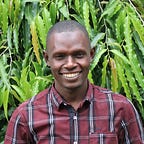Using Tech to tackle hunger
How a web-based application is helping fight hunger in South Sudan
It is 12:30 pm. The temperature is high under the mid-day scorching sun taking its toll on a group of women. Each woman is holding a blue card in her hand. They arrive at Malual Loch food distribution centre in Aweil north some 900 km north of South Sudan’s capital Juba.
As they join the snaking line, they are visibly troubled by its length.
Anticipating they may have to spend a better part of the day at this centre. But one of the women, Aman Deng Deng does not seem bothered by the length of the line as she knows that WFP’s SCOPE system is being used.
Unlike the rest of the group, it is her second time to receive assistance through SCOPE, a web-based application used for beneficiary registrations and distribution of entitlement including cash transfers. She is confident the process will be faster, and that she will be home early, in time to breastfeed her eight month-old baby.
“ In the past the process would take long, and we could spend the whole day at a distribution center,” she says as she waits her turn to get served. “Now we spend just a couple of hours to get the cash, this new system is the best.”
How it works
Under the system, people are bio-metrically registered. All their essential details including finger prints and pictures are captured, securely stored and they are then issued with a card.
Ensuring data protection
The use of data is overseen by a corporate data governance mechanism that provides rigorous safeguards to mitigate against risk of leakage and ensure data privacy.
In line with industry standards, the cyber and data security framework follows United Nations rules on data privacy, human rights and is consistently upgraded as technology and systems advance.
“This card is strong and can’t get destroyed easily,” says Aman. “Even when someone steals it, they cannot use it because it’s my details that are captured in the machine.”
A system for all activities
Aman and her friends participated in WFP’s Food Assistance for Assets initiative aimed at meeting short term hunger needs through providing people food or cash based transfers, in return for their work to create community assets that reduce the risk of disaster, strengthen livelihoods, and build resilience over time.
With support from donors such as Canada, European Union, Germany, Netherlands, United Kingdom and the United States of America, WFP has so far registered over two million people in SCOPE across South Sudan. Plans are underway to register an addition two million people by the end of 2020.
Aman is not the only one confident about the system. Agor Longar Aruop is an excited woman. For a long time she has received assistance using paper cards.
“I had been registered and given a card but because rain destroyed it, I could not be served,” says Agor. “ I went back home very disappointed.”
Sharing the technology
WFP has extended the technology to other partners to use as a means to get support to people, such as Welthungerhilfe (WHH).
In Greater Bahr el Gazal region where close to 3,000 families are registered under SCOPE, WHH has been using the technology to serve recipients in a three years food security and livelihood project funded by the German Federal Ministry of Economic Cooperation and Development (BMZ). Using the system WHH, is distributing seeds and cash to people in Aweil North and West.
Accountability
“As humanitarian needs surge and continue to outstrip available resources, ensuring that the right people are served is crucial,” says Matthew Hollingworth, WFP’s Country Director in South Sudan. “With technology in place, our mission to provide assistance to those who need it the most has received a boost.”
